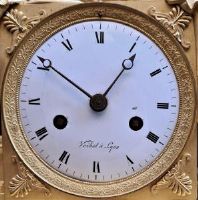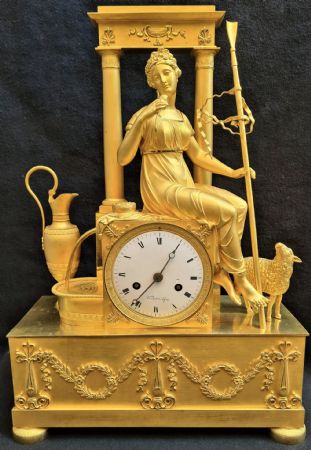Item : 368651
Paris-type mantel clock. The portico of love. Measurements cm h 44x30x12.
Period: First half of the 19th century
Clockmaker, from Tardy: "Veibel a Lyon", André, Quai de l'Hospice 1810. Measurements cm h 44x30x12.
Chiseled and mercury-gilded bronze. French manufacturing in the style and era of the 1st Empire, 805-15.
Subject: a woman sitting on the plinth, which contains the dial, holds a rose in her right hand, a symbol of love (there is no rose without thorns, a saying originated by Ovid "remedia amoris"). With her left, a spade tied with a ribbon, a symbol of a laborious life. At her feet on the left a sheep, a symbol of meekness and good character. On the right, a fountain springs from the plinth and a large amphora rests beside it, symbolizing life: water the life that is renewed, the amphora the woman as a container and giver of human life. Behind the figure a neoclassical portico with a frieze with a cup on the architrave, also an allusion to life, remember the myth of the sacred Grail. The base is decorated with shoots and garlands.
White enamel dial with Roman numerals and "Breguet" hands. Paris-type movement with half and hour chime via locking plate, on a large bell. Serviced and working. Perfect state of preservation.









